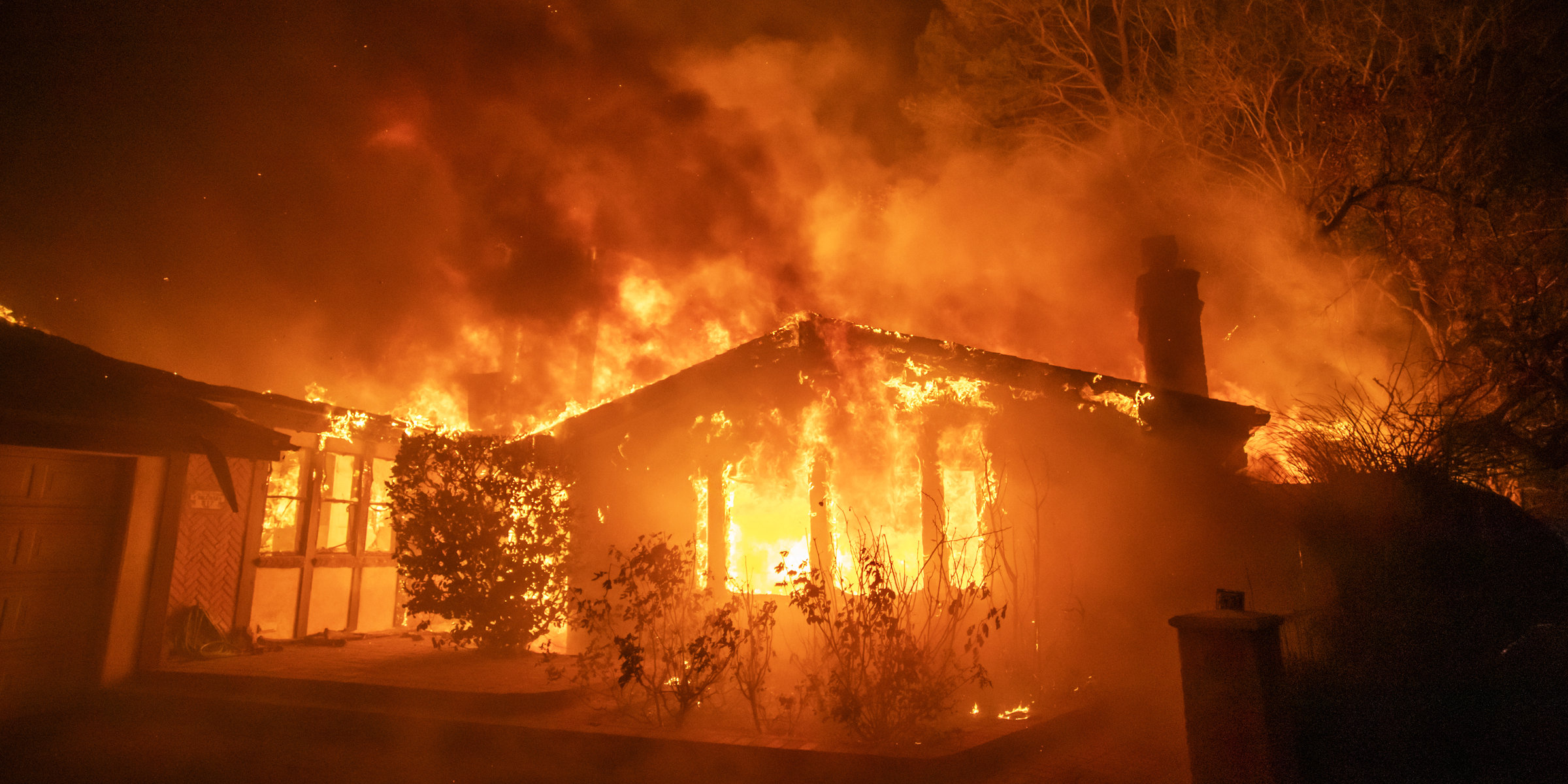
7 Steps to Take If Your Home Was Damaged by a Wildfire – Details
Following the outbreak of wildfires in California, which have led to evacuations and the intervention of state leaders, news outlets have provided steps people should take if their homes have been damaged.
As the raging wildfires in California continue to wreak havoc across the Golden State, countless civilians have suffered severe damage to their personal properties and houses. In an attempt to assist with the recovery of lost or damaged assets, several media outlets have shared important relief steps people can look into pursuing. Below is a curated list of seven measures.
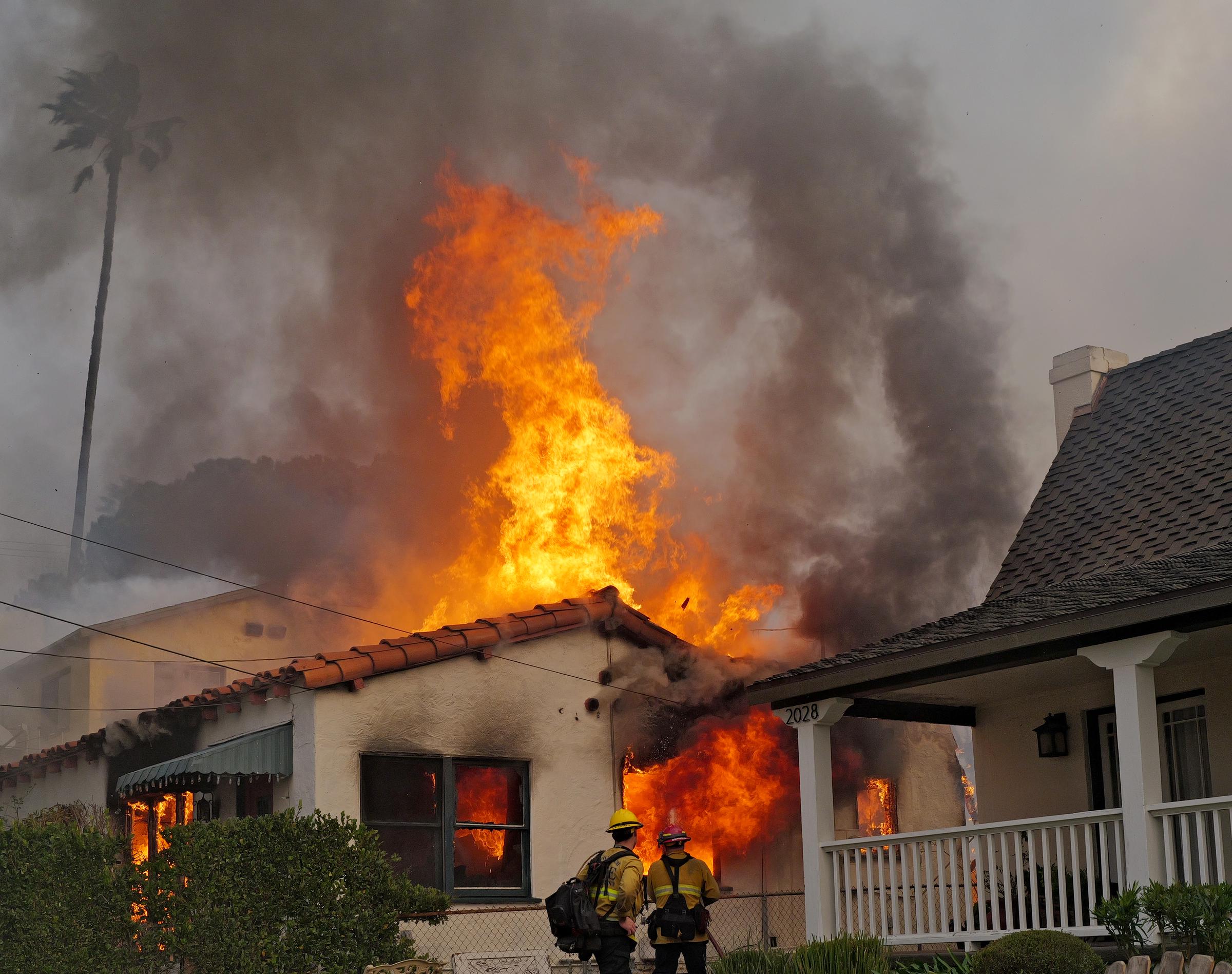
A home engulfed by flames caused by the Eaton Fire in the Altadena neighborhood in Pasadena, California on January 8, 2025. | Source: Getty Images
Step One: Securing Your Safety
According to California Insurance Commissioner Ricardo Lara, the first and most important step civilians should take is to ensure their access to safety and steer clear of disaster areas.
Step Two: Contact Your Insurance Provider
The Insurance Information Institute advises people to reach out to their insurance providers as soon as possible. Following this, individuals may get a visit from an insurance adjuster, who will come to the house and assess the damage.
People should be aware that their insurer will likely require a filled-out "proof of loss" form, which involves describing each damaged item, outlining the approximate date the item was purchased, and the cost of replacing or repairing the item.
Given how extensive the process is, it is suggested that civilians have a completed home inventory list on hand.
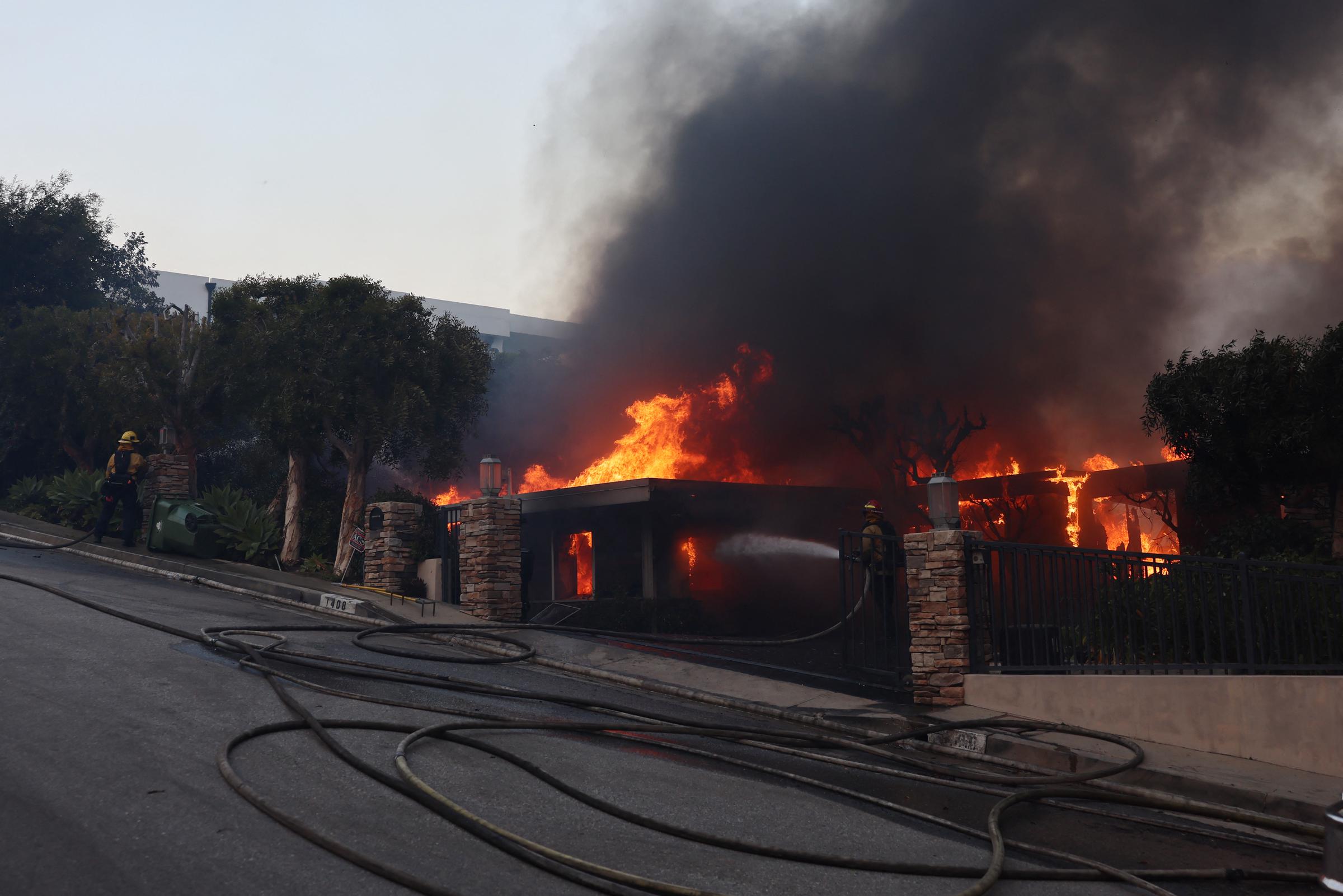
A firefighter dousing a house engulfed by flames from the Palisades fire in Palisades, California on January 7, 2025. | Source: Getty Images
Step Three: Abstain from Getting Rid of Damaged Items
Should it be possible and safe to do so, the Insurance Information Institute advises people to "keep damaged items until an insurance company representative has had a chance to assess the damage and make a claim report."
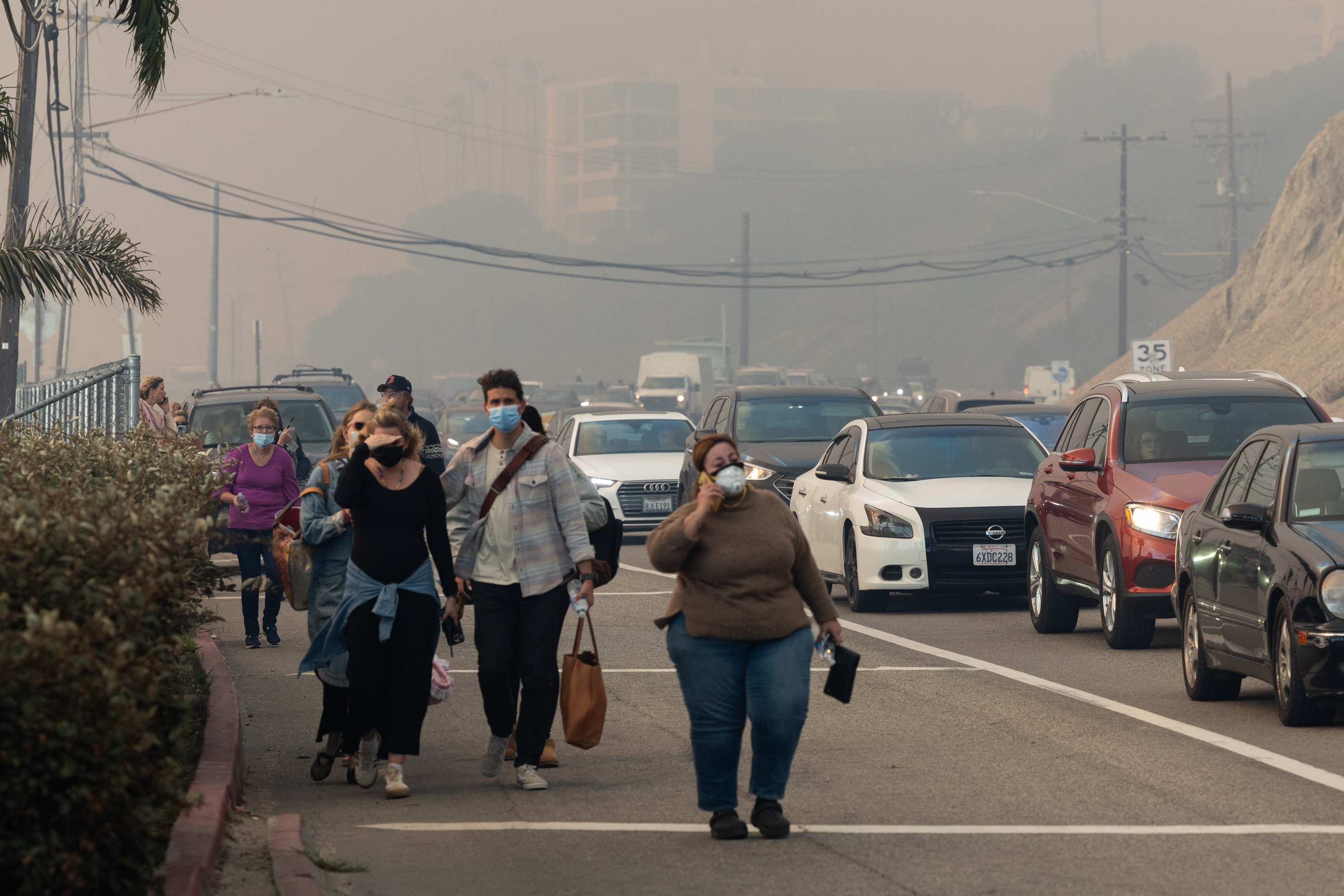
Residents evacuating their homes due to the brush fire in Pacific Palisades, California on January 7, 2025. | Source: Getty Images
Step Four: Be Aware of What Is Required of You
People should ask their insurance professional about their claim filing requirements, as the insurer may or may not require repair estimates.
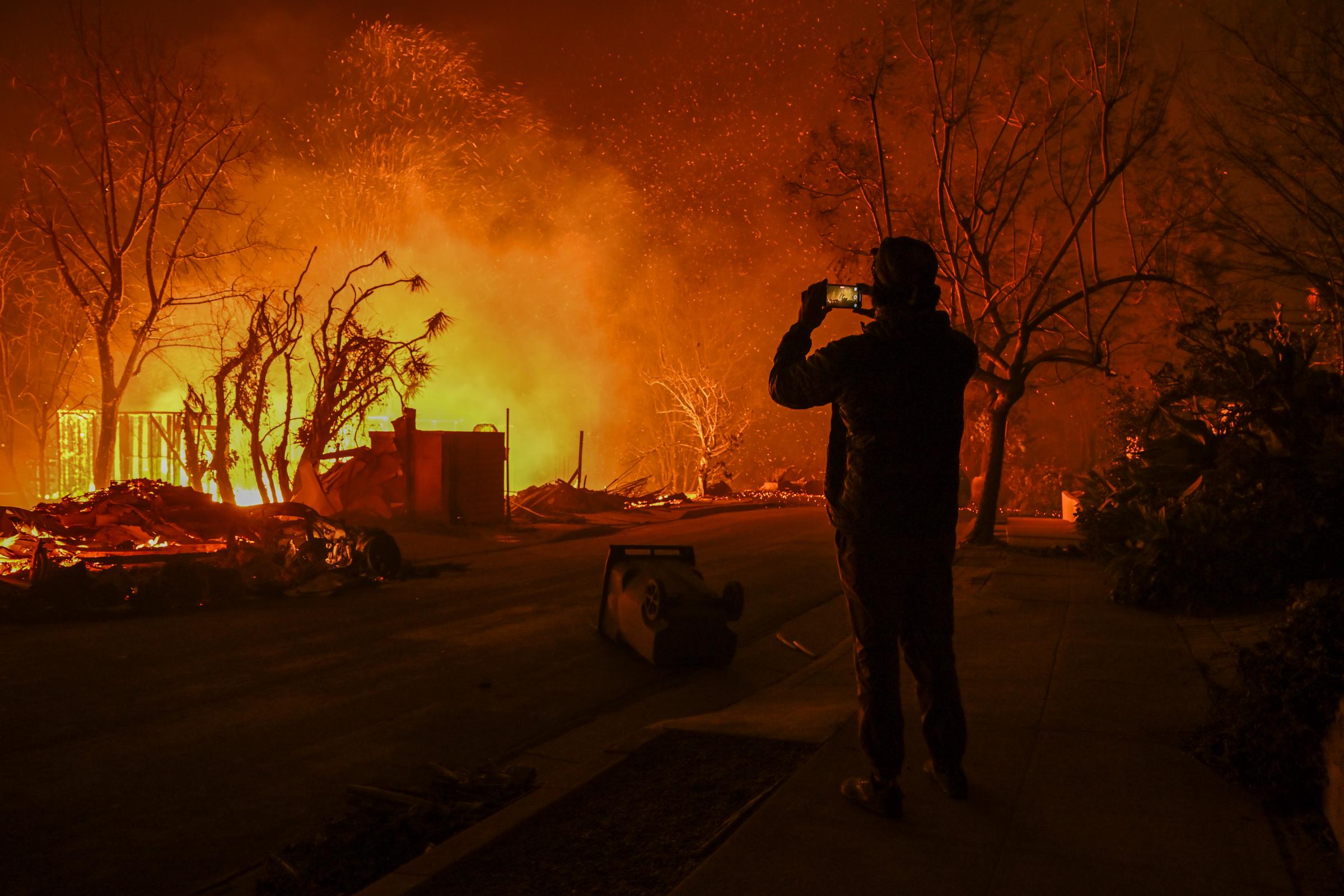
A civilian taking a photo of a house on fire in Pacific Palisades, California on January 8, 2025. | Source: Getty Images
Step Five: Know the Limits of Your Claim Time
According to the Insurance Information Institute, "Insurance policies generally place a time limit on filing claims and these vary from state to state and company to company. Check with your insurer to see what the time limits are so you don't miss your window of opportunity to file your claim."
Step Six: Keep a Log of Your Interactions with Your Insurer
Insurance Commissioner Lara urges civilians to ensure they keep track of all the conversations they have with their adjuster or insurer.
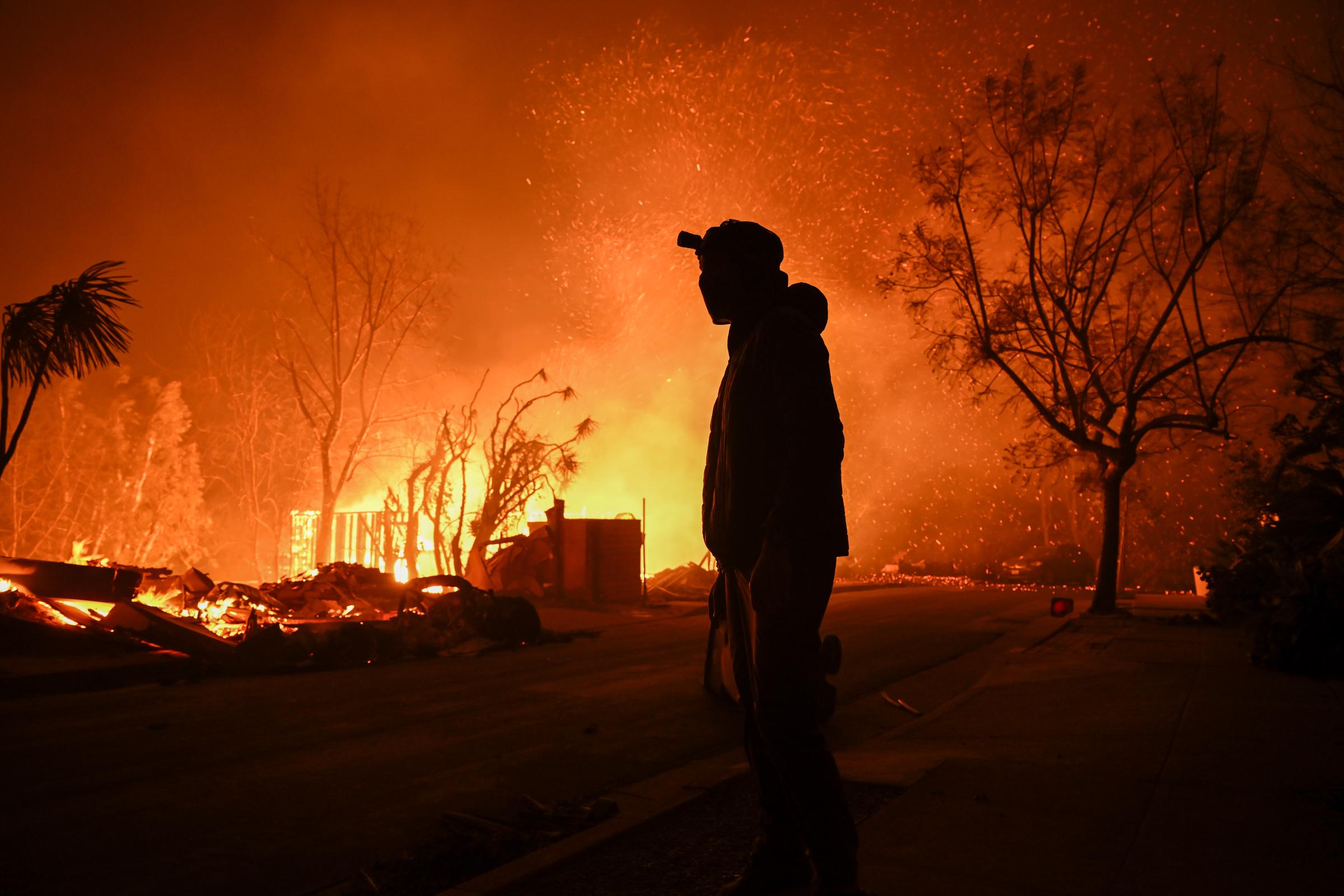
A civilian looking on as a home burns to the ground in Pacific Palisades, California on January 8, 2025. | Source: Getty Images
Step Seven: Keep Track of Your Expenses
According to Consumer Federation of America research and advocacy associate Michael DeLong, people should keep a log of their expenses. One way individuals can do this is by keeping all their receipts for things like food costs, temporary housing, and any initial repairs.
Aside from updating the public on steps they should take if they have damaged property, DeLong proposed measures to mitigate the reoccurrence of wildfire risks.
In this regard, the advocacy associate suggests the installation of a roof with noncombustible coverings. Another measure involves removing flammable vegetation from areas close to residences.
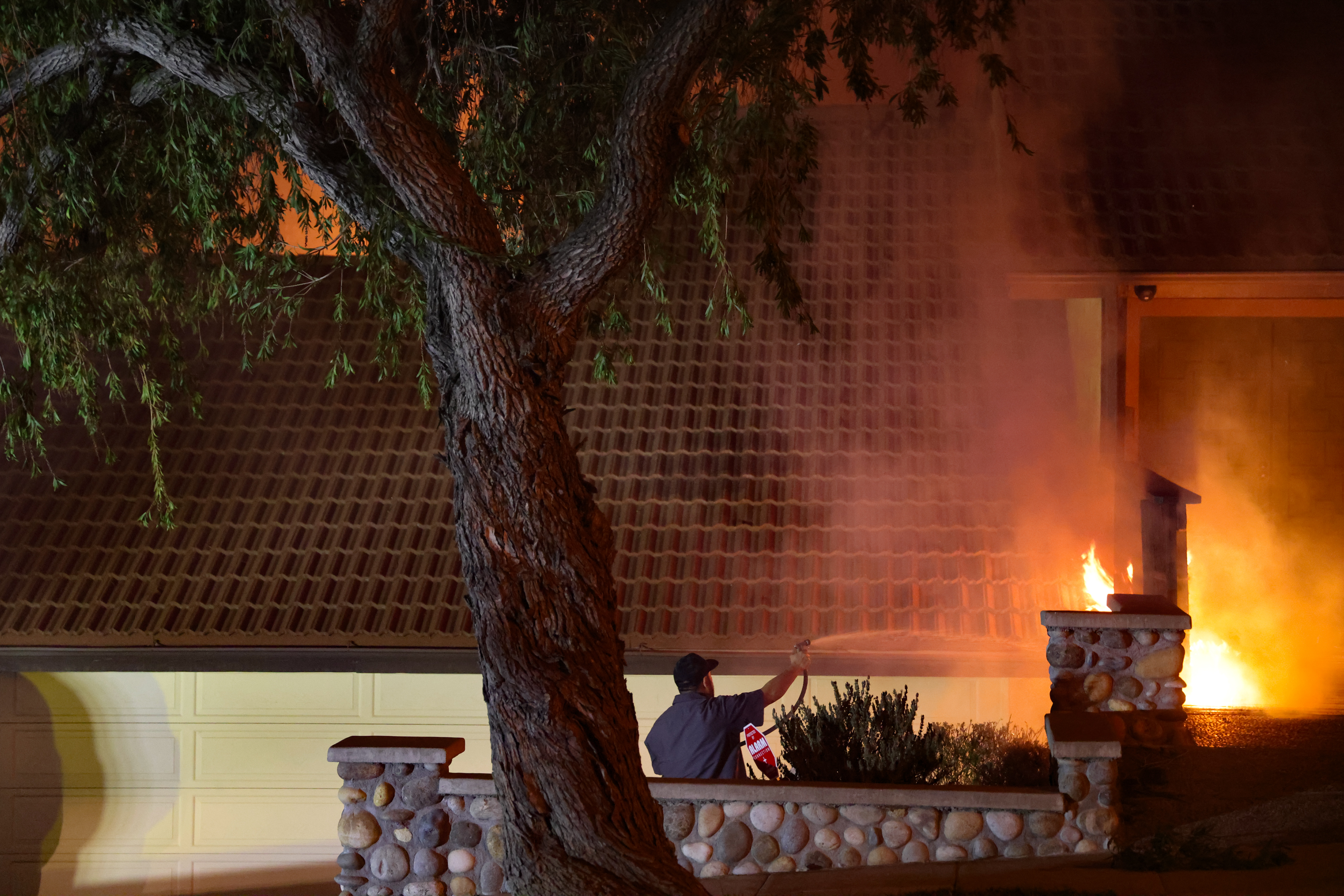
A civilian attempting to douse a house on fire in Altadena, California on January 7, 2025. | Source: Getty Images
While DeLong noted that measures such as the non-combustible roof covering can be costly, he also points out that doing so will end up saving people money in the long run. "In fact, it could actually save your home and even your life," he added.
However, DeLong also acknowledged, "The problem is that doing all these measures takes time and money and effort. And for people living paycheck to paycheck, that's really hard to do."
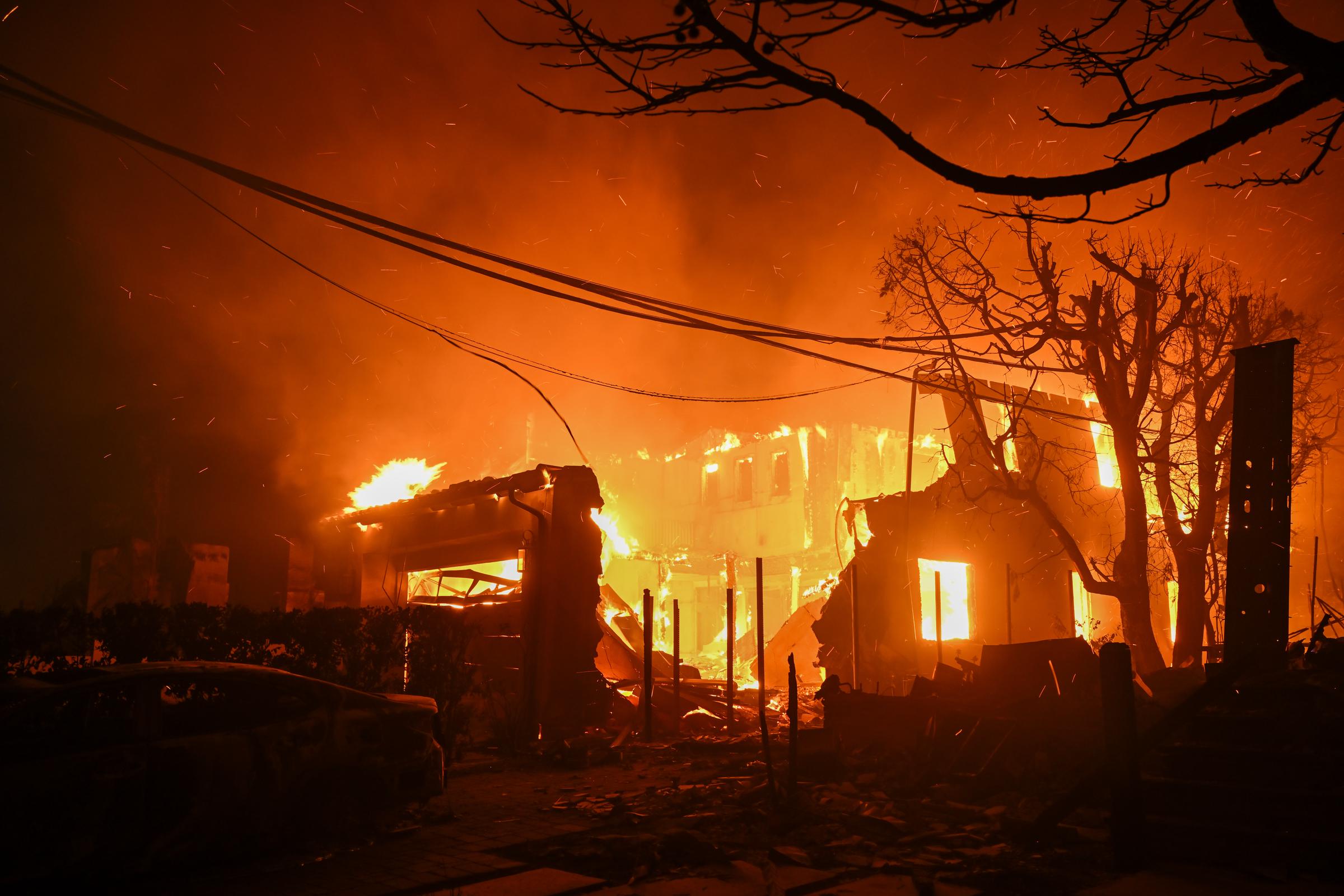
A home on fire in Pacific Palisades, California on January 8, 2025. | Source: Getty Images
On the other hand, Insurance Commissioner Lara focused on warning people to be thorough with their insurance dealings.
He urged the public to be aware of fraud, like when they are dealing with "out-of-state adjusters," who cut unfair deals and take advantage of individuals devastated by traumatic events and natural disasters.
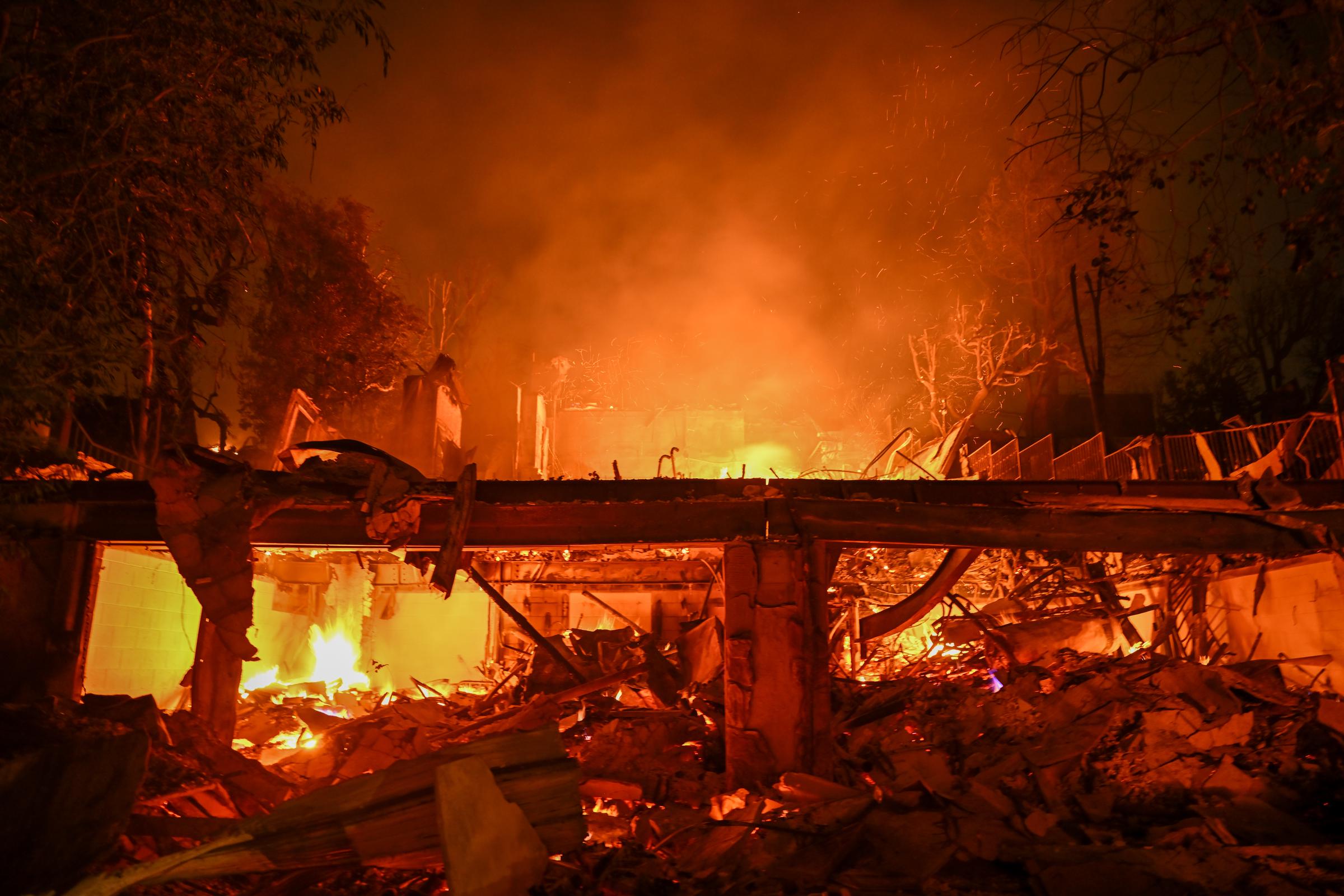
A house engulfed by flames in Pacific Palisades, California on January 8, 2025. | Source: Getty Images
In such instances, Lara suggests people take an adequate amount of time to do their due diligence and check with the insurance department to verify the credentials of an adjuster before signing any insurance deals.
"This is a very traumatic moment... and we want to let them know that please look out for fraud, do not sign anything, and we're here to be able to help them through the entire process," stated Lara.
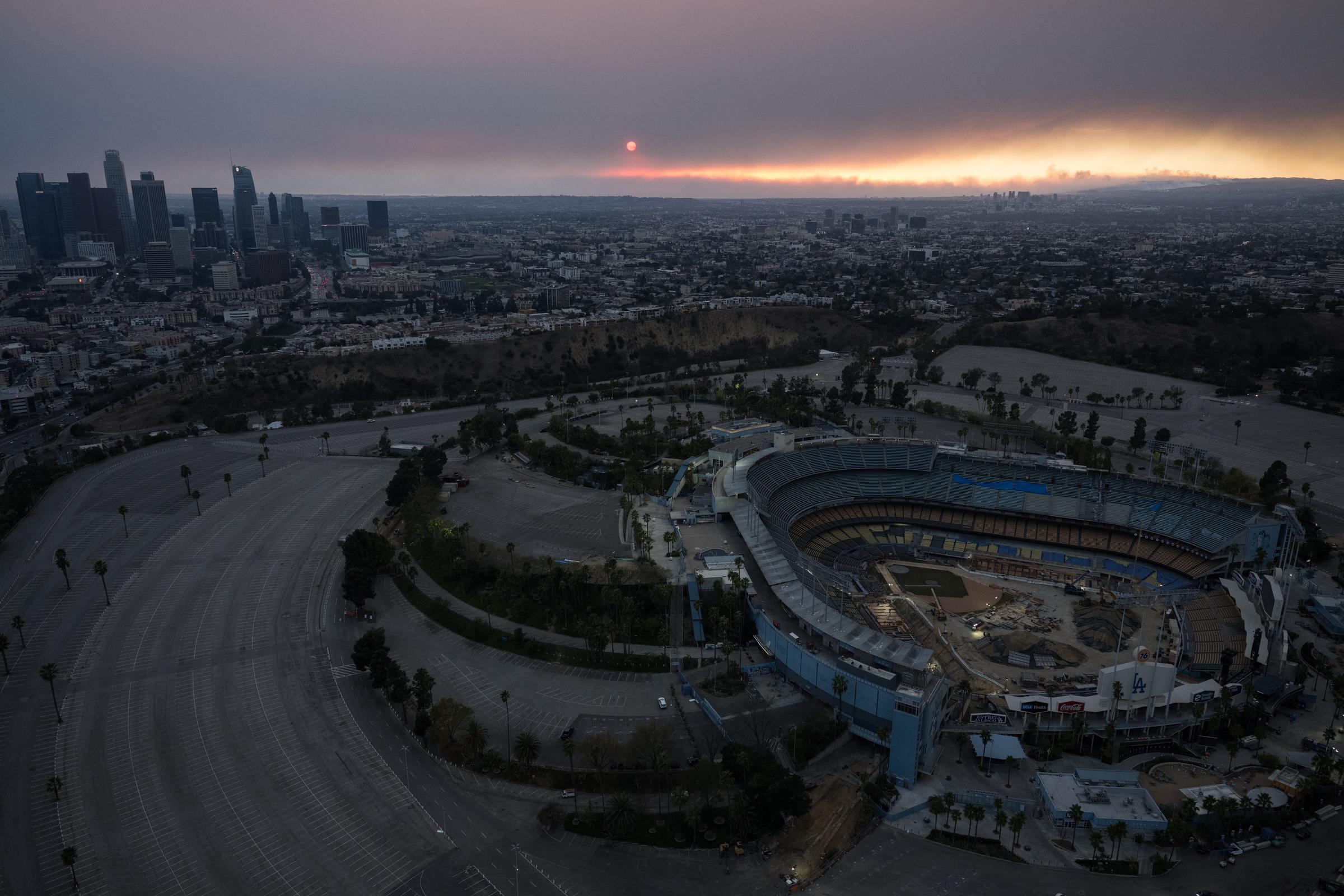
An aerial shot of the sun setting behind the downtown Los Angeles skyline and Dodger Stadium as the sky is engulfed in dark smoke caused by the wildfires in Los Angeles, California on January 8, 2025. | Source: Getty Images
People can contact the California Department of Insurance, where live operators are ready to address any concern they may have.
The organization is reachable at 1-800-927-4357 or people can visit their website, insurance.ca.gov. "It's very important that you know you have somebody on your side," remarked Lara.
The aforementioned information is particularly vital for the public to acknowledge, as experts have reportedly cautioned that the situation with the wildfires could worsen.
On January 7, 2025, fierce winds intensified the flames, prompting over 30,000 Los Angeles residents to evacuate as the crisis escalated.
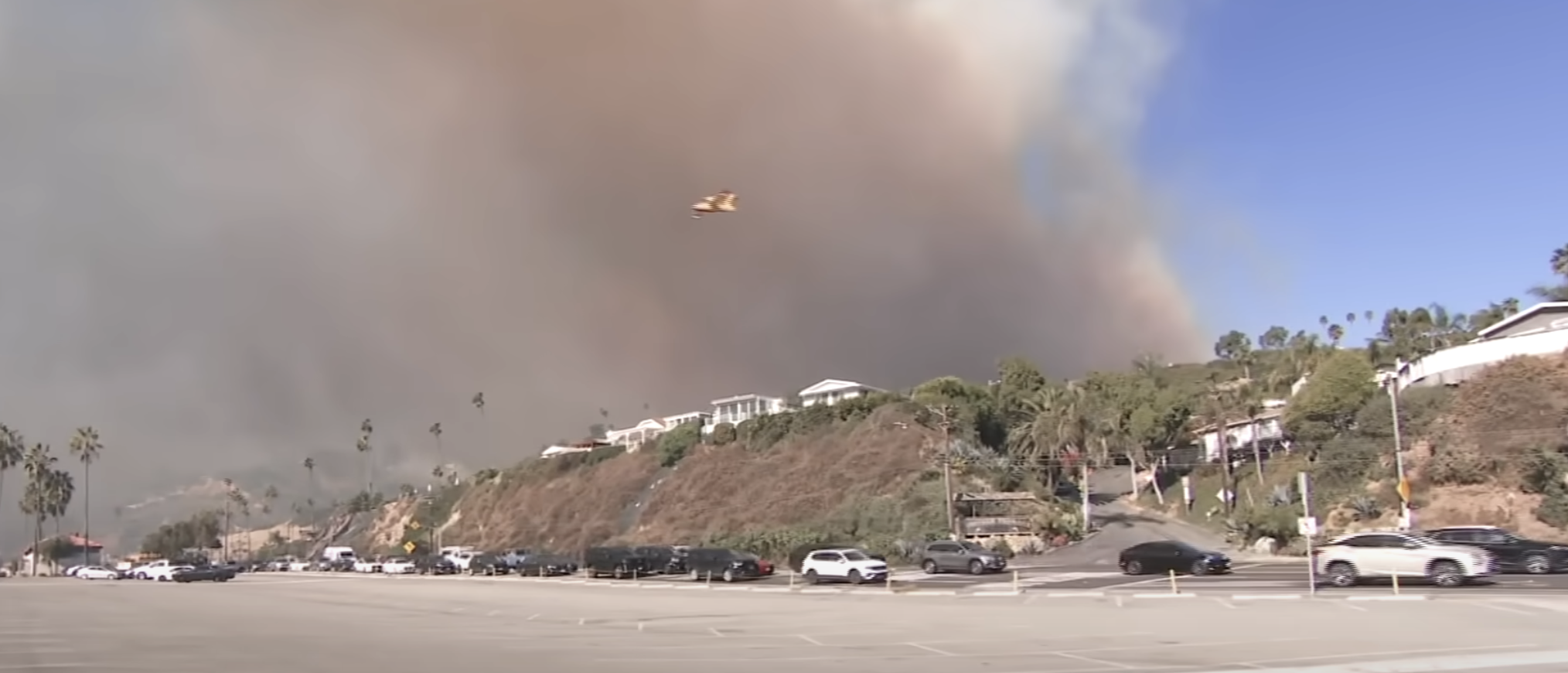
Southern California engulfed in flames in Los Angeles, California on January 7, 2025. | Source: YouTube/CBSEveningNews
Fires in the Pacific Palisades and Pasadena areas remained unchecked, with wind speeds expected to reach a record-breaking 100 miles per hour. This posed a significant threat overnight.
The fires ravaging Los Angeles have ignited on both sides of the city. In the west, the Palisades fire tore through over 2,900 acres in Pacific Palisades, a coastal area near downtown. On Tuesday (January 7, 2025) the blaze rapidly expanded, doubling its size within just three hours during the afternoon.
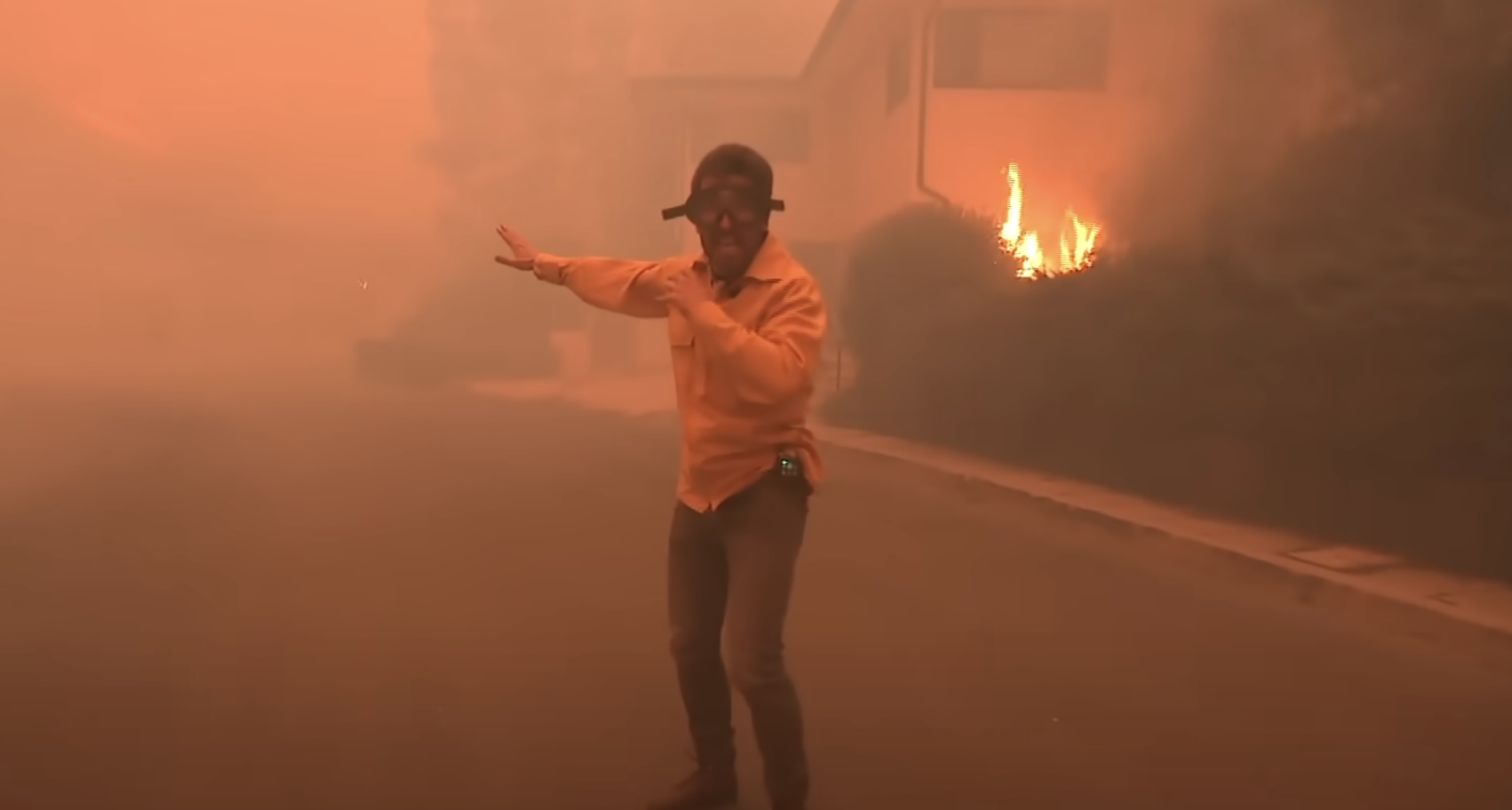
Jonathan Vigliotti reporting from the scene in Los Angeles, California on January 7, 2025. | Source: YouTube/CBSEveningNews
While the Palisades fire continued its rapid spread to the west, another blaze erupted to the east in Eaton Canyon, nestled in the San Gabriel Mountains above Altadena. Dubbed the Eaton fire, it consumed 1,000 acres by nightfall on January 7.
Meanwhile, to the north, the Hurst fire expanded to 100 acres in Sylmar, a San Fernando Valley suburb, prompting further evacuations as the flames threatened homes and communities.
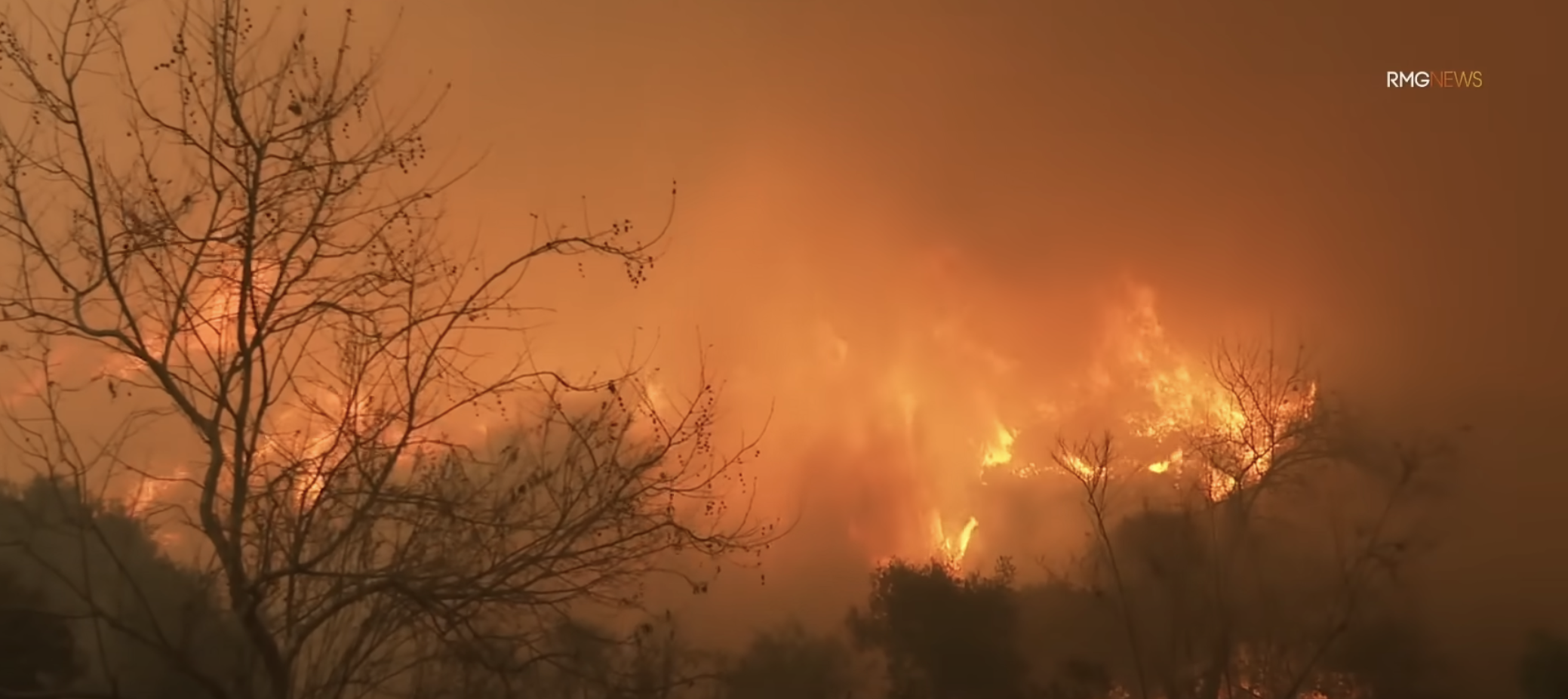
The wildfire pictured in Los Angeles, California on January 7, 2025. | Source: YouTube/CBSEveningNews
As wildfires continue to threaten communities across Southern California, authorities have issued evacuation orders and warnings for numerous areas.
An evacuation center has been set up at the Westwood Recreation Center, located at 1350 South Sepulveda Blvd, Los Angeles, to assist those displaced by the fires.
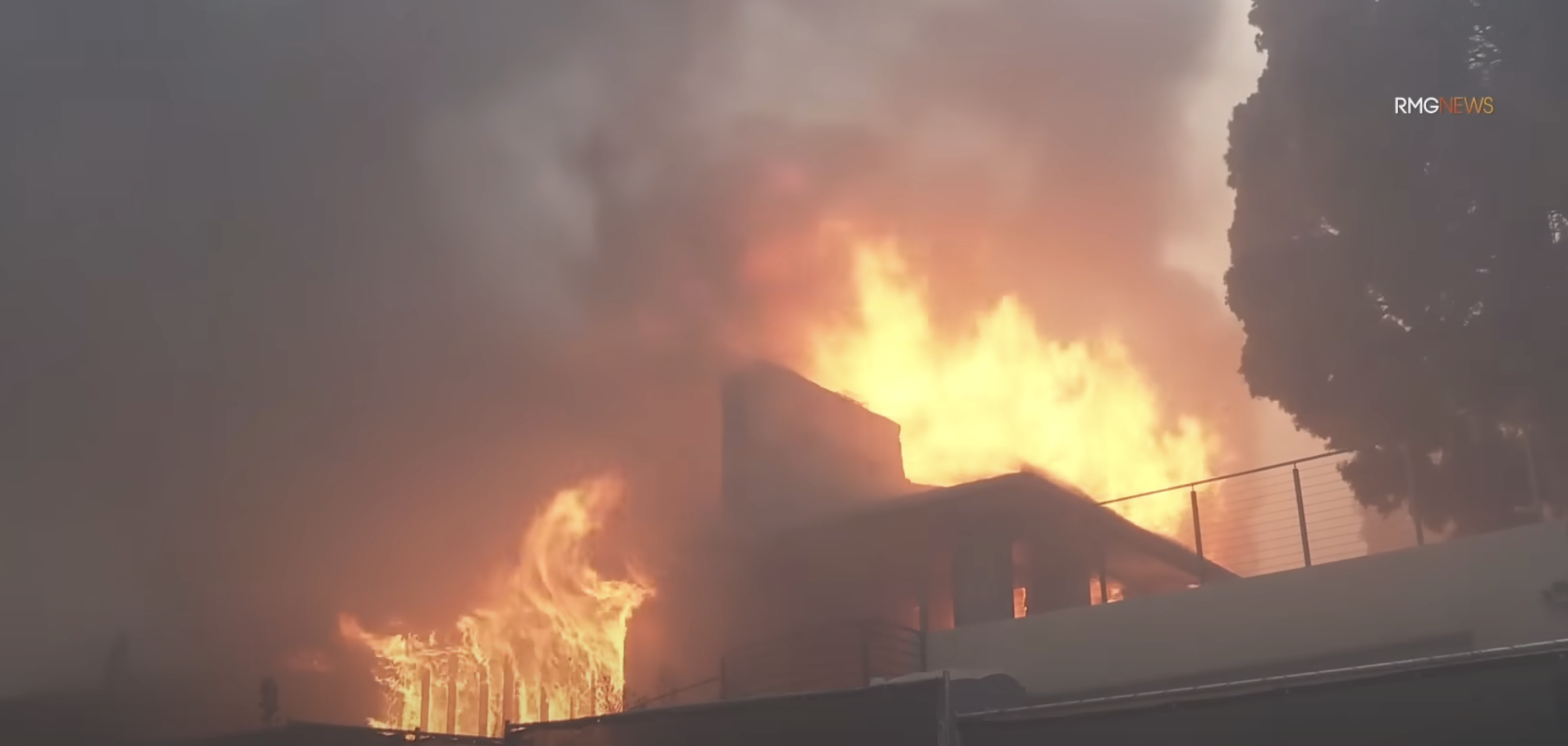
A house engulfed in flames in Los Angeles, California on January 7, 2025. | Source: YouTube/CBSEveningNews
As evacuation efforts persist, the scope of destruction remains unclear. Los Angeles Fire Chief Kristin M. Crowley noted that several structures in Pacific Palisades had been damaged, though the exact number was still unknown.
Additionally, officials reported that the Palisades fire threatens over 10,000 households and 13,000 structures, while the Eaton fire has placed at least 550 homes in danger, according to Pasadena spokesperson Lisa Derderian.
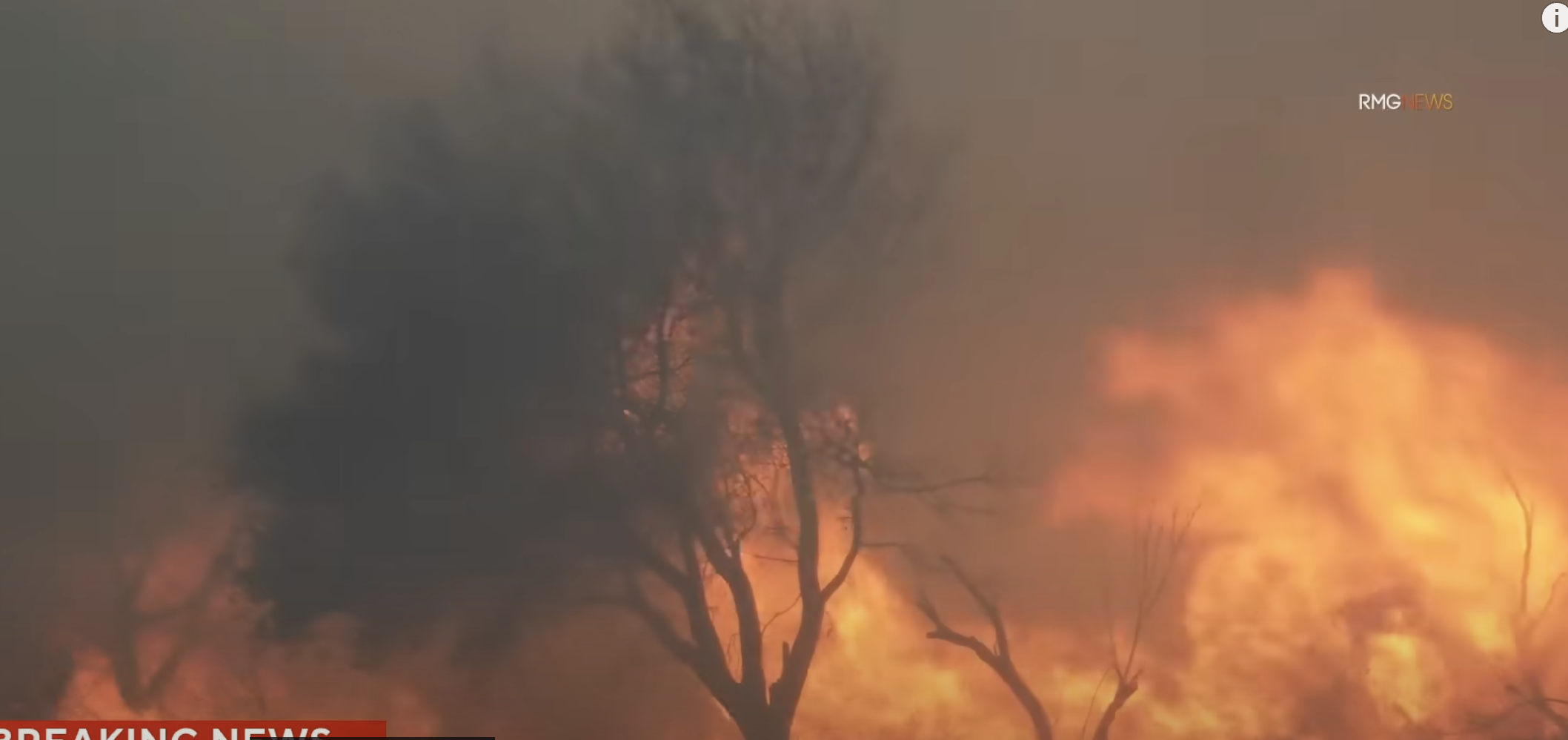
Wildfire ravaging Southern California in Los Angeles, California on January 7, 2025. | Source: YouTube/CBSEveningNews
As the fires continue to spread unchecked, officials remain focused on battling the rapidly growing threats. The Eaton fire, which began in Altadena just north of Pasadena, has expanded to 1,000 acres within six hours and, like the Palisades and Hurst fires, is completely uncontained.
Fire crews, who began their efforts on January 7, are now facing worsening conditions as strong winds intensifed overnight, which made containment efforts even more challenging in the early hours of January 8.
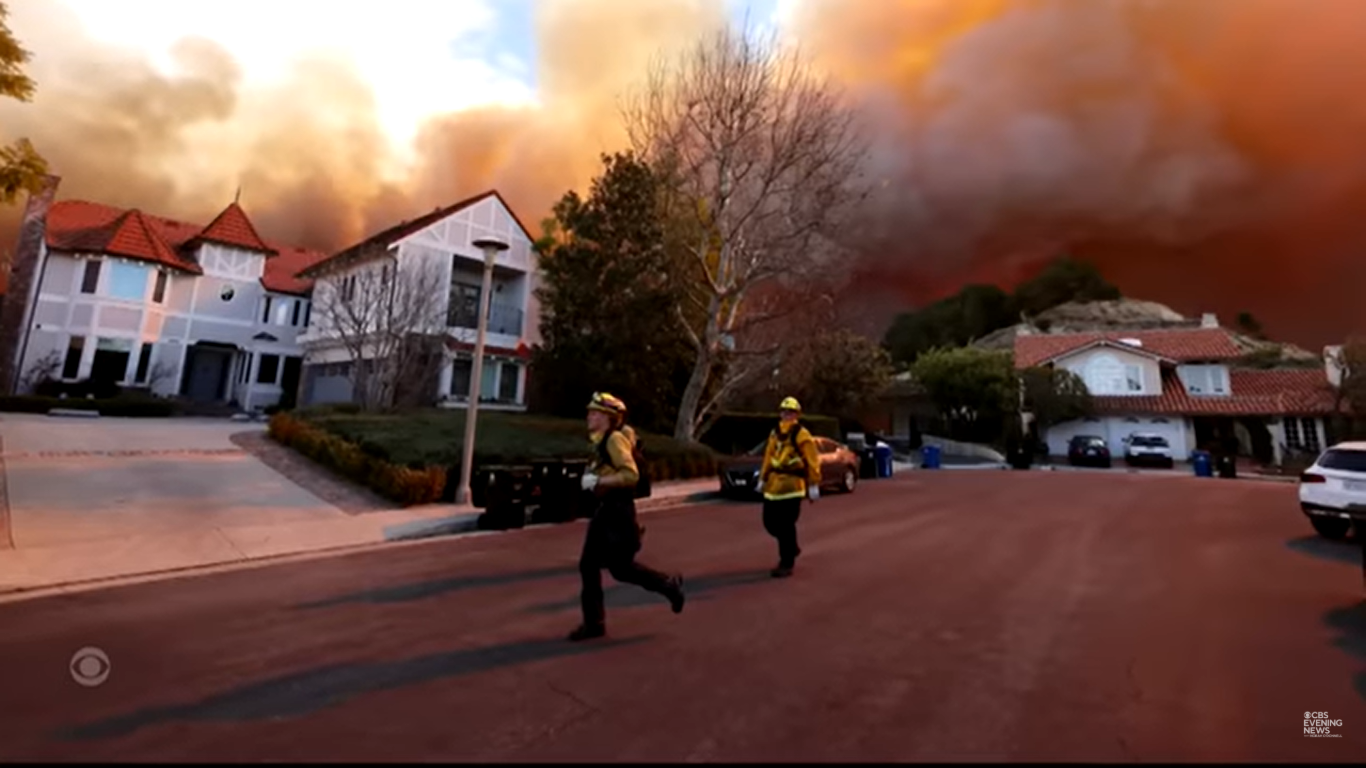
Firefighters pictured at a wildfire scene in Los Angeles, California on January 7, 2025. | Source: YouTube/CBSEveningNews
The unrelenting fires are the result of a perfect storm of dangerous weather and environmental conditions. Southern California has been gripped by strong winds, reaching speeds of 50 to over 100 miles per hour in some mountain areas, combined with extremely dry air.
Overgrown vegetation, spurred by two rainy winters but left dehydrated by this season's lack of rain, has become highly flammable. Forecasters have warned that this is "about as bad as it gets in terms of fire weather."
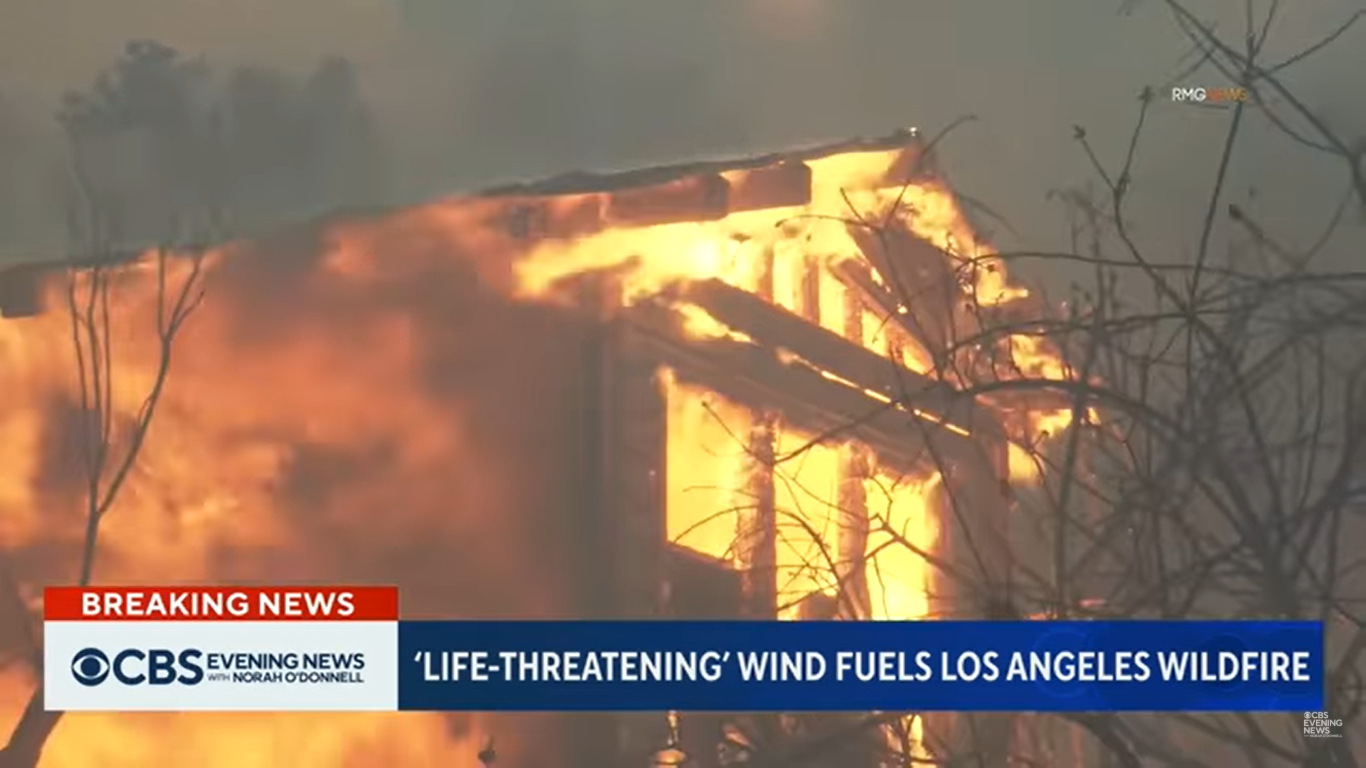
A house engulfed in flames in Los Angeles, California on January 7, 2025. | Source: YouTube/CBSEveningNews
These extreme conditions are further intensified by the seasonal Santa Ana winds, which bring dry, forceful gusts from Nevada and Utah. Historically, these winds have fueled some of California's most devastating wildfires, including the 2018 inferno that destroyed the town of Paradise.
With extreme weather persisting, officials warn that the fires could escalate further. Wind speeds were forecast to peak between the late evening of January 7 and early morning of January 8, potentially fueling rapid and unpredictable fire growth.
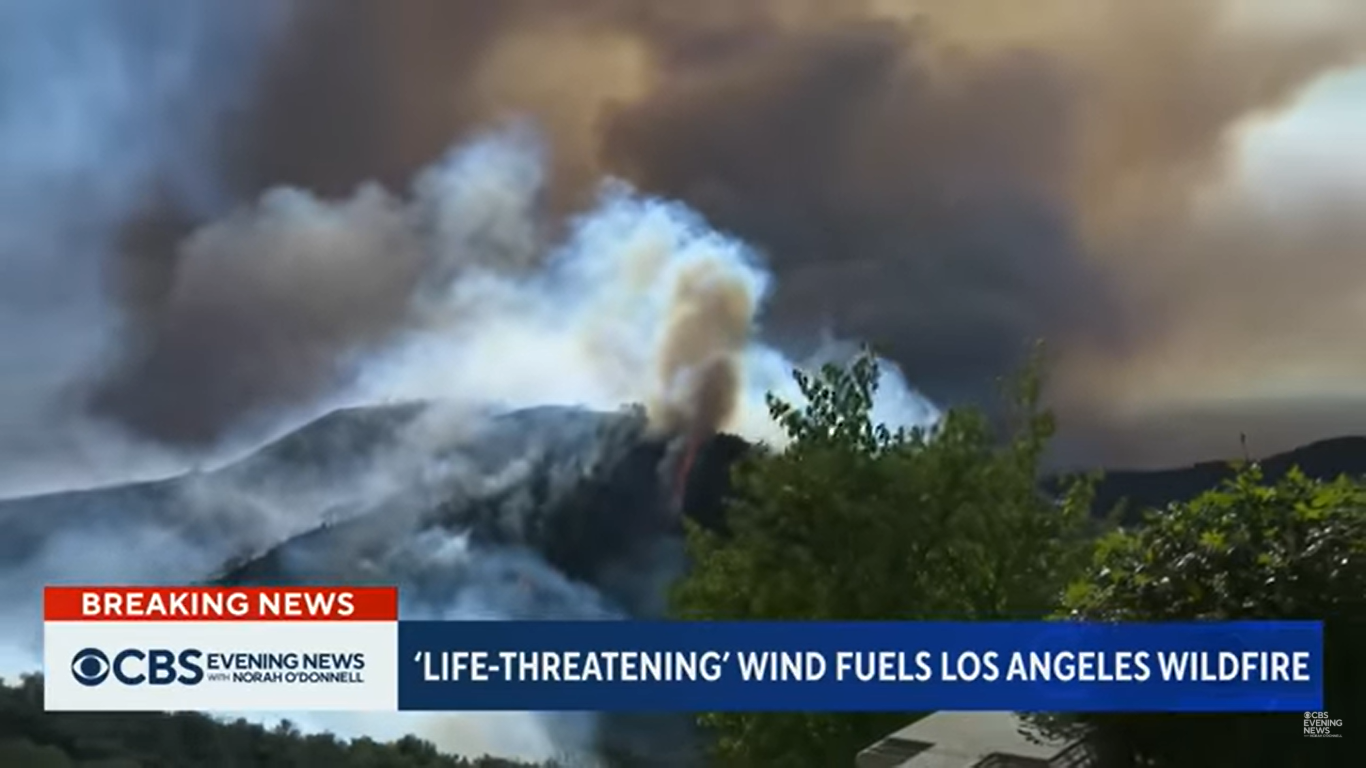
A mountaintop pictured on fire in Los Angeles, California on January 7, 2025. | Source: YouTube/CBSEveningNews
Authorities have called on those near the fires who have not yet evacuated to remain on high alert and be prepared to leave if necessary. Residents throughout Southern California are also being cautioned to stay vigilant for new fires sparked by the dangerous conditions.
The severity of the fires has also prompted direct attention from state leaders. California Governor Gavin Newsom shared his observations after visiting the impacted areas, where swirling winds, embers, and widespread destruction left a lasting impression.
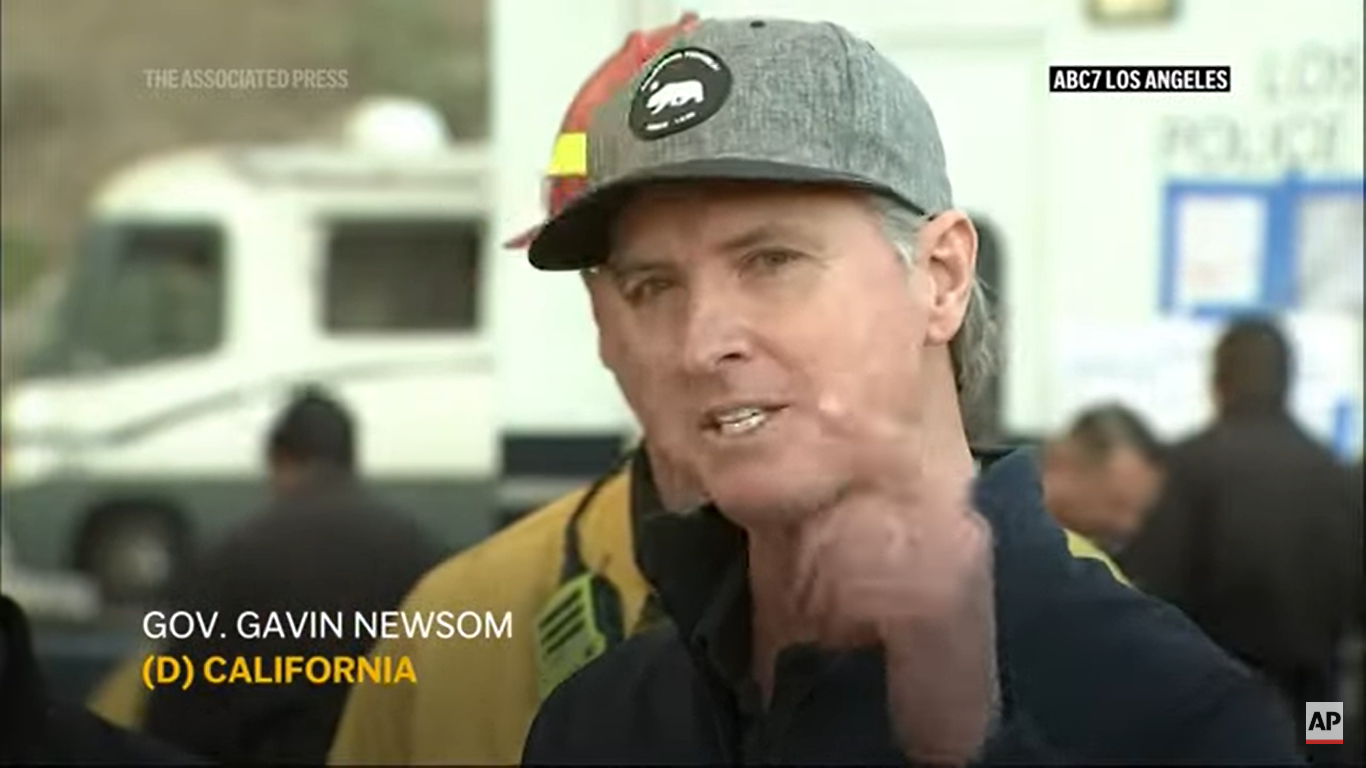
Governor Gavin Newsom during an interview in Los Angeles, California on January 7, 2025. | Source: YouTube/AssociatedPress
He noted the alarming number of structures lost, emphasizing that "the fact that people were still not evacuated, still did not heed the warning, were just coming down the canyon, is a reminder of how serious this moment is and how important it is you listen to these evacuation orders."
Newsom's urgent message aligns with warnings from local fire officials as extreme fire weather continues to grip the region. Los Angeles Fire Chief Crowley described the conditions as unprecedented, noting that the city remains under a red flag alert.
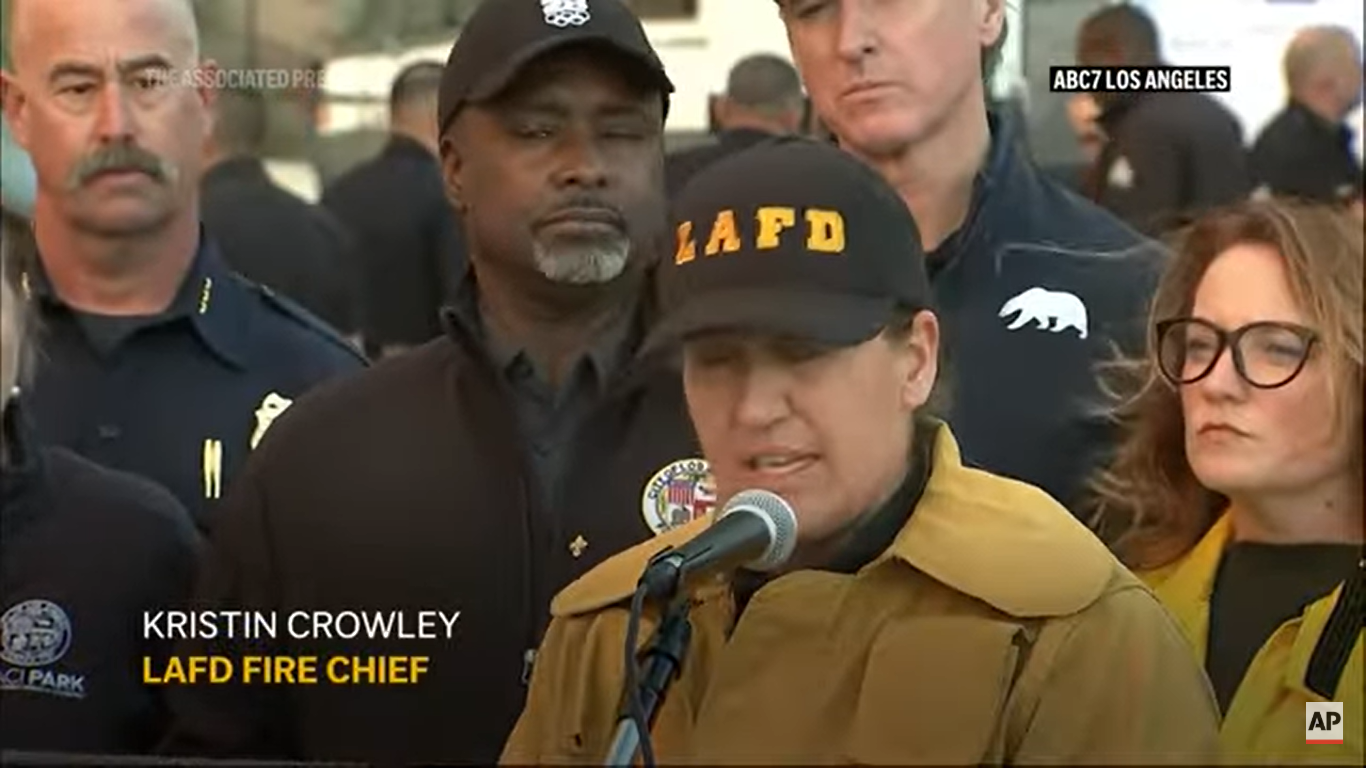
Kristin Crowley during an interview in Los Angeles, California on January 7, 2025. | Source: YouTube/AssociatedPress
"Currently, the fire is at 1,261 acres and growing based on aerial reconnaissance," she reported. According to Crowley, the combination of intense winds and challenging terrain are major factors complicating containment efforts for the crews battling the flames.
Efforts to contain the Palisades fire faced a setback on January 7, as strong winds grounded firefighting aircraft. Operations were halted around 8 p.m., with officials stating they would resume when conditions improved. They are reportedly dealing with blowtorch conditions.
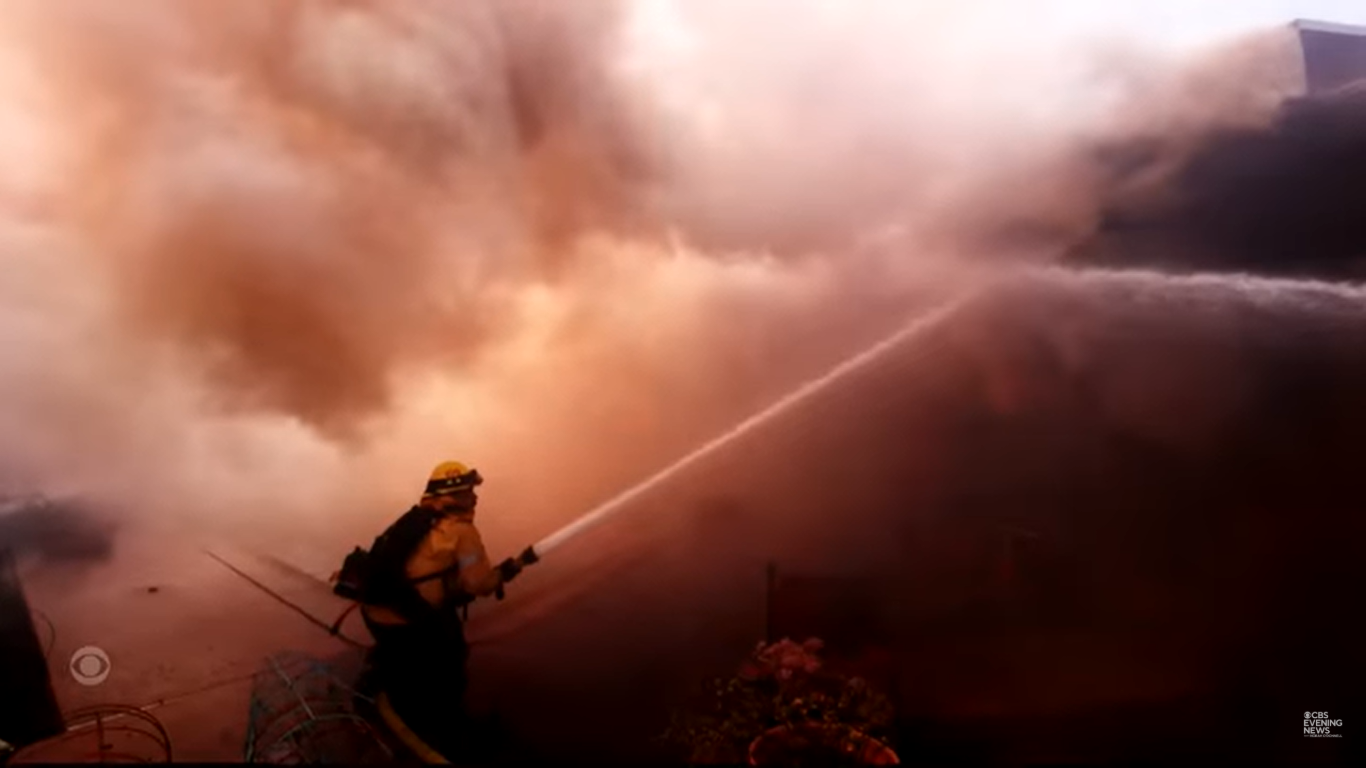
A firefighter attempting to douse a wildfire in Los Angeles, California on January 7, 2025. | Source: YouTube/CBSEveningNews
By 11 p.m., the fire remained completely uncontained, and "extreme fire behavior" continued to challenge crews, according to the fire department. Wind gusts of up to 60 miles per hour are expected to persist through January 9 (today), which will further complicate containment efforts.
"This event is not only not over, but it is just getting started and will get significantly worse before it gets better," warned UCLA climate scientist Daniel Swain during a briefing.
The National Weather Service echoed these concerns, predicting that this windstorm could become the most destructive to strike the Los Angeles region since 2011.
As Southern California battles one of its most challenging wildfire events in recent years, the combination of extreme weather, dry conditions, and unpredictable winds continues to threaten lives, homes, and communities.
With thousands evacuated and firefighters working tirelessly under hazardous conditions, officials urge residents to remain vigilant, heed evacuation orders, and stay prepared for rapidly changing circumstances.
As the situation unfolds, the resilience and cooperation of those impacted will play a crucial role in navigating this devastating crisis.
